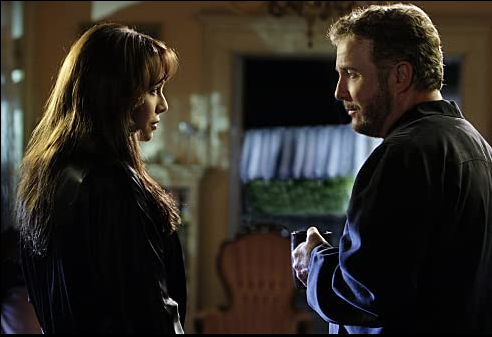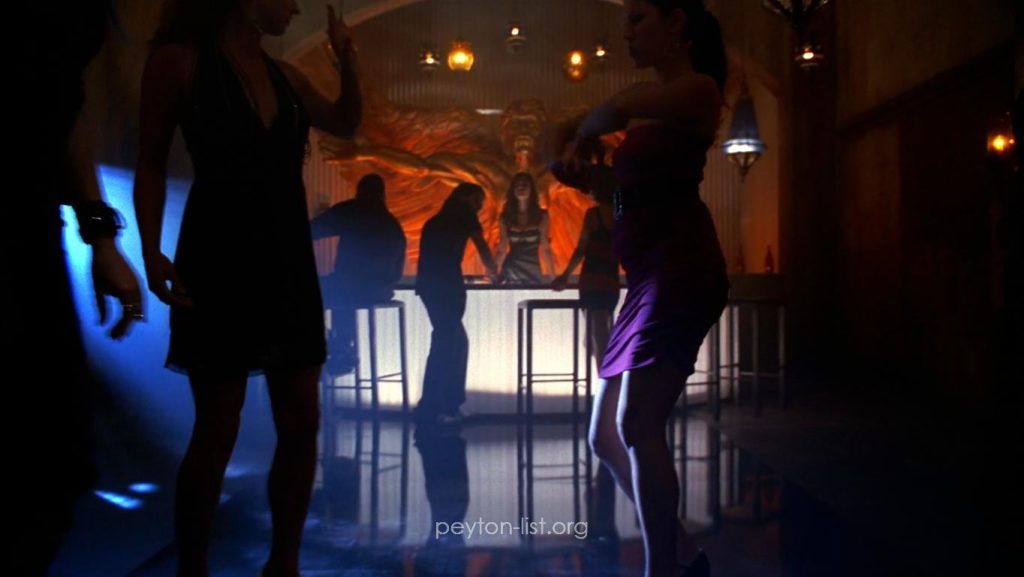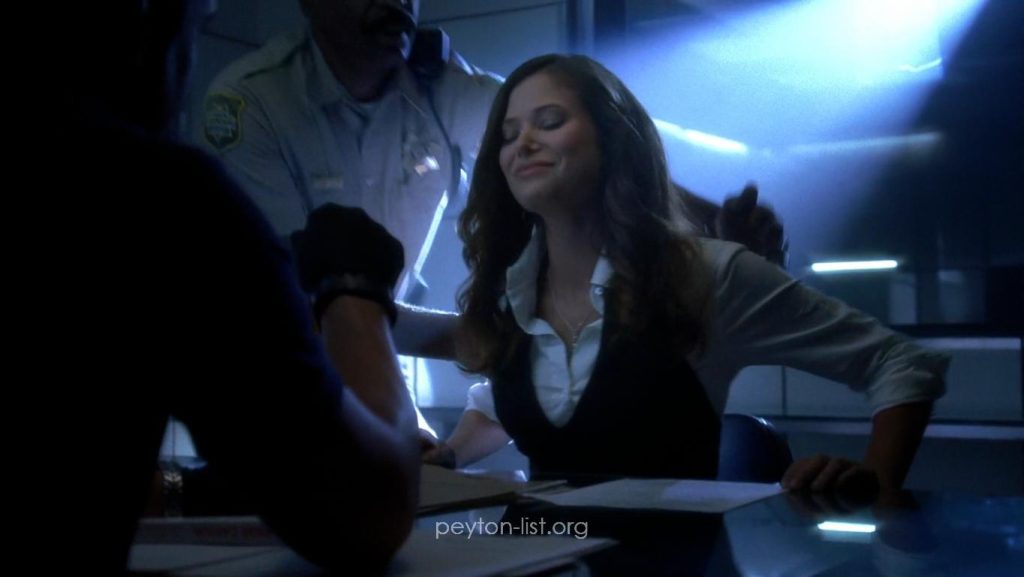
CSI S09E05 “Leave Out All The Rest” IMDB Aired November 6, 2008
The discovery of a dead body (what else?) with the marks of S&M leads Grissom back to Heather Kessler.
In this case, it’s a set of markings from needle play around the man’s nipples, out of place next to all the corpse’s other injuries.
Grissom: “S and M?”
Willows: “Gone very, very wrong.”
ME: “These stab wounds are brutal, random and postmortem”,
Willows: “Which is inconsistent with S&M.”
ME: “Well, it’s hard to take pleasure in someone’s pain once they’re dead.”
Willows: “Which is the ‘gone wrong’ part.”
After the low point of the last episode, in which Heather was offering herself up to be murdered for money to provide for her grand-daughter, she’s somewhat recovered. No longer a dominatrix, she’s finished a Masters in psychology and is a practising therapist.
Heather’s transition to therapist from dominatrix who acts like a therapist makes a degree of sense. It’s consistent with the trope of pro-dominatrix-as-caregiver that turns up so often in mainstream media. (E.g. Going Under, Personal Services). It further desexualizes an already desexualized character. In this episode, Grissom is grieving his beakup with Sara Sidle, and his emotionally stunted interactions with Heather are with her as a caregiver, not a lover.
Also note that after being much more mobile and active in the previous two episodes, Heather reverts to being stationary in her home.
Examining the victim’s home reveals a trunk full of BDSM toys, and that he had a live-in lover who was a dominant, but was having sex with another woman. Heather makes the shaky assumption that because the victim didn’t have a dedicated room for play, he must have played in other establishments. That leads to a club card for Lower Linx.
Heather: “Lower Linx is part of the amateur scene. They have a well-equipped back room. You have to know the right people. Rents by the hour.”
Wouldn’t it be simpler to say that they do parties and people use their equipment?

We get another sequence of Brass and Stokes entering Lower Linx, where everybody is a lot prettier, younger and whiter than they should be. In their cop’s-eye view, everybody immediately looks suspicious. This is backed with the original “Venus in Furs” track from The Velvet Underground & Nico.
Whereas Lady Heather was completely welcoming when police officers came to her establishment, Michelle, the manager of Lower Linx, is immediately uncooperative to the investigators. In the logic of CSI and police procedurals in general, this marks her and her establishment as suspicious. She also denies having security cameras.
Michelle: “Being Big Brother is your job.”
Brass: “Well, Big Brother would like to see the back room.”
Michelle tells them to get a warrant, but the cops just hang around her bar until she gives in. She leads them to a back playroom. Reaction shot of Brass and Stokes as if they, and the audience, are supposed to be put off by this. Examination of the toys reveals ones that match the marks on the victim’s tongue.
Back at Heather’s place, she examines the pictures of the victim’s home and psychoanalyzes him and his live in partner. This is psychological profiling, a forensic system which has undergone a lot of criticism, much like forensics in general. Her judgements are even flimsier than usual, asserting that Ian’s lover Justine wasn’t his dominant, and not his killer.
In this case, she’s correct, as Justine turns up dead, burned to death and identified by her breast implants.
Heather serves tea to Grissom in her Victorian-style home
Heather: “In the heterosexual world, men want to be dominated by women, and women by men, so Wallace would have had a female dominant.”
This is one of her strangest pronouncements. While it’s generally true that there are more submissives than dominants in the straight world, it doesn’t follow that there are no dominants.
Grissom: “Well, we’ve confirmed that through physical evidence. She also slept with him.”
Heather: “Which is why one should always go to a professional. They know the boundaries.”
Another unfounded assertion from the world of professional domination, implying that dominants and submissives should never have sex together.
Grissom: “I feel the same way about crime scene investigators.”
Heather: “And no one has more rigid boundaries than you.”
[…]
Heather: “If your dominant is the killer, she would most likely choose a slave to assist her. Someone she can trust and control.”
Grissom: “Which would be a man.”
Heather: “Amateurs often play scenes in groups. And a domme would select a slave that shares similar fantasies and fetishes.”
Heather continues to mark bizarre proclamations. Professionals never do group scenes? And a female domme who wanted to commit murder would automatically turn to her submissives, and not anyone else in her life? I’m increasingly convinced all of this is based on the writer’s guesswork and not any actual research.

That’s apparently enough to pull Michelle Tourney in for interrogation and they grill her about denying knowing the first victim. Again, she asserts her rights and asks why he wants all this personal information, and he bluntly says, “It doesn’t matter. I have a warrant.”
Michelle: “Yes, I facilitate people’s BDSM scenes. It’s a way to make money. It’s not something I practice. I’m an entrepreneur. I majored in theatre.”
She admits Ian Wallace came in a lot, and they slept together. She denies having been to his house, or him having been to hers.
When Nick tries to get a DNA sample, she refuses and calls him a fascist for insisting. Stokes has to ask the cop in the corner to threaten to arrest her for obstruction. She gets up and the cop forces her to sit down. Nick looks smug as he takes the sample from her mouth.
Michelle: “Turns you on, didn’t it? I bet you’re standing at attention. Hypocrite. You’re no different than the freaks who rent my back room.”
The show almost critiques itself when Michelle accuses Stokes of being aroused by his exercise of power, to coerce a woman into having her DNA extracted by inserting something into her mouth. Stokes doesn’t deny it. While Grissom has always advocated forensics as a purely objective, dispassionate matter of collecting and analyzing information, this scene suggests the libido is part of police work, especially if it means having power over young, attractive and unwilling women.
Heather reviews the multiple stab wounds on the first victim, and says it’s the mark of a sexual sadist.
Heather: “That’s highly unusual.”
Grissom: “Why? There must be sexual sadists that seek out that world.”
Heather: “See, sexual sadists are typically charming loners. They would be repulsed by a consensual, safe and communicative lifestyle. When a submissive says stop, you have to stop. That doesn’t work for a sexual sadist. They get off on the terror of their subjects.”
Grissom: “So you think that S&M play was not involved in the murders. They were separate events.”
Heather: “That would be my expert opinion.”
Suspicion turns to an insurance salesman, whose attorney does a great job defending him in the interrogation room. (Where was she when Michelle was being questioned?) It turns out that the insurance salesman was being dominated by his attorney, who was also dominating the first victim.
Unusually for CSI, the episode ends without narrative closure. The investigators review the evidence and admit they can’t link the suspects to the crime scenes, and consider the possibility that Ian and Justine were murdered by people unrelated to the BDSM scene.
Stokes: “The S&M factor gave us all tunnel vision.”
While Grissom visits Heather to consult on the case, she realizes that he’s actually distraught over Sara leaving him to work on an oceanographer ship. The episode ends with her offering him her guest room, and him asking her to stay in the room with him.
***
It seems that knowing about BDSM makes you an expert, the highest authority in the world of CSI, but actually doing it makes you a deviant, inherently suspect. Heather had to be even further removed from the practice of BDSM to make her fit into the series’ ideology. Heather and Grissom’s relationship is implied to be emotional but platonic, something they’d both prefer.
In the world of CSI, crime is usually the result of individual psychology, not broader social issues like economic inequality, racism, sexism or homophobia. In the previous Lady Heather episode, the focus was on the man who wanted to pay to kill her, not her husband’s prejudice against her as a sex worker and/or BDSM practitioner. In this episode, Heather’s assessments of the people involved are accurate (easy in fiction), but she missed the key point that none of these people killed anybody. There was no need to investigate them in the first place.
Whenever CSI investigates a sexual subculture, it invariably discovers a tangle of secrecy, lies, jealousy, infidelity and other problems. In this case, however, it did not culminate in murder. Whatever personal problems these people had, was it the state’s business to violate their privacy? All of the coercive investigations and psychological profiling of the kinky people proved to be irrelevant, and two murders remain unexplained.
Note: the two murders in this episode are resolved in later episodes of season 9.



